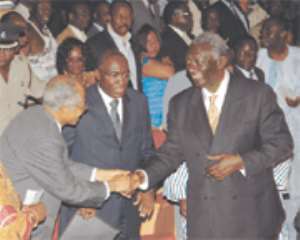
The new Educational Reform, aimed at developing a highly-skilled, technologically-advanced and disciplined workforce to service the country's growing economy, was launched in Accra yesterday by President John Agyekum Kufuor.
The reform, which kicks off on September 1 this year, is expected to advance the literacy rate in the country by nearly 100 per cent by 2015.
In his address, the President announced that an apprenticeship programme organised jointly by the state and industry for the acquisition of skills would be made available to students who either did not make it to the Senior High School or opted for employment after Junior High School.
The cost of the first year apprenticeship, he said, would be borne by the state.
The President said 15 out of the 38 teacher training colleges being upgraded were being specially equipped for Science, Mathematics and Technology, which constituted the new focus of the educational delivery programme.
He announced the establishment of a National Teaching Council to regulate the profession and the provison of special incentives to teachers, especially those in the rural areas.
President Kufuor said the Government was extending the national broadband backbone connectivity to all parts of the country to facilitate the development of ICT infrastructure in schools.
That, the President explained, was an acknowledgement of the mastery of ICT as a priority to the reform, adding that ICT skills was crucial for survial in the global world.
At the tertiary level, President Kufuor said the government was committed to increased access.
He said the policy, therefore, was to expand residential accommodation, lecture halls, laboratories and libraries in public tertiary institutions.
He commended the private sector for providing 10 out of the 16 universities in the country, saying it was necessary at that level “to attract and retain a critical mass of young faculty that have both energy and enthusiasm for research”.
The President called on families, religious groups, NGOs, civil society and the media to join hands with school authorities in creating a comprehensive network to ensure a rational educational system.
The Minister of Education, Science and Sports, Papa Owusu-Ankomah, said the reform had become necessary to address the failures in the past system, where about 60 per cent of JSS three students were neither equipped for the world of work nor the continuation of formal education.
He said the old system churned out a large number of students, who were not proficient in craft or technical skill for meaningful work and were deficient in English and Mathematics for the continuation of education.
Another reason for the reform , according to the minister, was the fact that the centralised Ghana Education Service could not manage the process and its systemic faults.
Papa Owusu-Ankomah said the reform had taken into consideration recent global trends and a sober analysis of the present educational system.
The minister outlined some of the major changes in the reform as the institution of a Council for Technical and Vocational Education Training, which would develop, co-ordinate and regulate all aspects of technical and vocational education training.
Papa Owusu-Ankomah said there would be two types of aprenticeship training regulated by a National Apprenticeship Training Board.
Story by Nehemia Owusu Achiaw
& Doreen Allotey




 This IMANI job no dey pap; the people you are fighting for are always fighting y...
This IMANI job no dey pap; the people you are fighting for are always fighting y...
 Prof. Naana Opoku-Agyemang has changed; you can see a certain sense of urgency –...
Prof. Naana Opoku-Agyemang has changed; you can see a certain sense of urgency –...
 MFWA Executive Director slams Akoma FM for engaging in ‘irresponsible’ media pra...
MFWA Executive Director slams Akoma FM for engaging in ‘irresponsible’ media pra...
 ‘Women must become millionaires too’ — Prof Jane Naana on establishment of Women...
‘Women must become millionaires too’ — Prof Jane Naana on establishment of Women...
 Some believe only in Ghanaian votes, not Ghana — Kofi Asare jabs politicians
Some believe only in Ghanaian votes, not Ghana — Kofi Asare jabs politicians
 Plan to make BEST sole aggregator of Sentuo Oil Refinery will create market chal...
Plan to make BEST sole aggregator of Sentuo Oil Refinery will create market chal...
 2024 elections: I can't have the man I removed from office as my successor — Aku...
2024 elections: I can't have the man I removed from office as my successor — Aku...
 2024 Elections: Immediate-past NPP Germany Branch Chairman garners massive votes...
2024 Elections: Immediate-past NPP Germany Branch Chairman garners massive votes...
 Gov’t focused on making Ghana energy self-sufficient, eco-friendly – Akufo-Addo
Gov’t focused on making Ghana energy self-sufficient, eco-friendly – Akufo-Addo
 April 25: Cedi sells at GHS13.74 to $1, GHS13.14 on BoG interbank
April 25: Cedi sells at GHS13.74 to $1, GHS13.14 on BoG interbank
